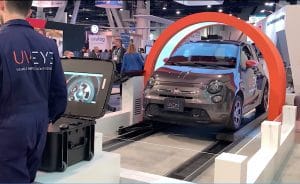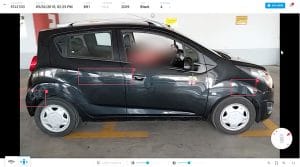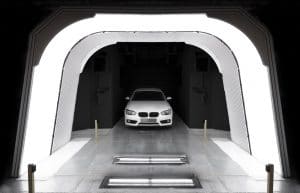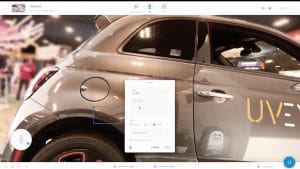An Israeli company, UVeye, has developed a new process using high-resolution cameras and additional technology that allows automakers and other auto-related companies to detect defects in both old and new vehicles.
Amir Hever, CEO and co-founder of Tel Aviv-based UVeye, which displayed the technology at CES earlier this month, said his firm’s vehicle-inspection technology can be used in assembly plants, dealerships, car auctions and hubs for vehicle fleets. For example, the technology is being used by a bus company in Tel Aviv to predict potential failures even before they occur, he said.
The technology is also being used on assembly lines by companies such as Volvo, Daimler, Skoda and Toyota to detect defects in finished vehicles after they roll off the assembly line. Automakers in North America also are interested in the technology, he added.
(First Corvette C8 draws $3 million at Barrett-Jackson)
UVeye’s technology enables vehicle manufacturers, logistic operators, retailers, insurance and rental-car companies to carry out vehicle inspections quickly, Hever said. It deploys first-of-its-kind artificial intelligence, purpose-built for vehicles and has proven it can drive higher accuracy and improve efficiency with minimal human intervention.
Its drive-through systems can detect external and mechanical flaws and identify anomalies, modifications or foreign objects – both along the undercarriage and around the exterior of the vehicle, Hever said.
Hever, who co-founded the company with his brother, Ohad, said the defect-detection technology grew out of UVeye’s first system, which was developed to uncover security threats such bombs, weapons or drugs hidden in the undercarriage of vehicles.
The threat detection systems are deployed now at high-security locations throughout the world and have generated millions of vehicle scans at border crossings, vehicle check points, hotel entrances and other sensitive locations.
(Tesla buys German gigafactory site for $45 million)
Hever said UVeye is now expanding its product portfolio for broader use in the automotive sector.
The Atlas inspection system uses multiple high-resolution cameras to capture exterior assembly defects, post-production damage, missing components and other quality-related issues. Atlas generates thousands of images per second at multiple angles to detect scratches or dents as small as two millimeters in diameter.
“Our new deep-learning technology will dramatically change how car makers, their suppliers, dealers and major fleet operators inspect vehicles,” said Hever. “We currently are working with a number of vehicle manufacturers to provide inspection systems on assembly lines and at dealerships around the world.”
He noted that the company’s proprietary algorithms, cloud architecture, sensor fusion, artificial intelligence and machine-learning technologies allow it to automatically check vehicle chassis components, suspension systems, sheet metal and tires within seconds.
UVeye’s product portfolio also include Helios, an underbody scanning system that captures problems such as frame damage and fluid leaks, as well as brake and exhaust system issues and Artemis, a camera-based technology that automatically verifies the tire’s specs and checks tire wear and quality, including tire pressure, tread wear and sidewall flaws.
(Chinese government official offers rosier 2020 sales forecast)
The scanning process completes within a matter of seconds and can be used throughout the entire lifecycle of the vehicle. The technology is being actively deployed across many use cases, from the vehicle manufacturing line – the moment components are placed on the conveyor belt through end-of-line inspection.





What a nonsense.
Amir’s father, David Hever is the owner of Elgoteam, a security company in Israel.
Elgoteam developed a few years ago undervehicle scanning system which was a huge technical failure.
since the product had so much negative impact, his sons are trying to launch a similar system with some modifications but with significant technical issues as a seperate company called Uveye.
Do they think that everyone is stupid enough to buy their false stories.
There are better companies which offer superior systems, look them up and do not get mislead.